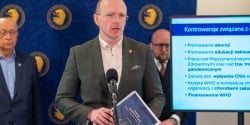Published: 19.05.2025

• The 78th World Health Assembly, the deliberative body of the World Health Organization, begins today in Geneva.
• During the event, a vote is scheduled on the so-called Pandemic Agreement, which would globally regulate WHO activities in the area of pandemic prevention.
• This issue was addressed during a press conference organized by the Ordo Iuris Institute.
• A report describing the WHO’s activities, including controversial areas such as the promotion of abortion, sex education, and work on anti-pandemic regulations, was presented at the conference.
READ THE REPORT (IN POLISH) – LINK
The conference on WHO activities took place on May 19, the opening day of the World Health Assembly meeting. Speakers included Jerzy Kwaśniewski, President of Ordo Iuris; Patryk Ignaszczak, author of the WHO report; Prof. Bogdan Chazan, a gynecologist and representative of MaterCare International; and Grzegorz Płaczek, MP and chairman of the Polish Sejm’s Parliamentary Group on the World Health Organization.
The event was opened by Jerzy Kwaśniewski, who emphasized that information about the World Health Organization’s activities often fails to reach broader public awareness.
“Important, groundbreaking things are happening at the WHO. They often occur outside the attention of the mainstream media. We may suddenly be surprised by changes to the International Health Regulations or by a new Pandemic Agreement. These developments may significantly impact our lives, as they will influence the health policy of the Polish government and the European Union," he pointed out.
The Ordo Iuris president also emphasized that global awareness of controversial WHO actions is growing, with far-reaching consequences.
"The ideological commitment of the World Health Organization has already led to the withdrawal of its largest net contributor, the United States, as well as to Argentina initiating the process of denouncing the WHO Constitution. The departure of these two countries from the WHO could signal the beginning of a domino effect," the lawyer noted.
Patryk Ignaszczak, the report’s author, explained the rationale behind its publication. One major reason is the ongoing development of the Pandemic Agreement at the WHO.
"A significant portion of the treaty’s successive drafts has generated numerous controversies. These include the potential limitation of member states' sovereignty, the expansion of WHO powers, and possible restrictions on freedom of expression under the guise of combating disinformation," the analyst pointed out.
Jerzy Kwaśniewski then presented the contents of the Ordo Iuris report, highlighting the controversies associated with the WHO’s actions.
"Immediately after the COVID-19 pandemic, the WHO began demanding super-competencies for itself. In cooperation with the UN Secretary-General, the WHO Director called for authority not only to define what constitutes a pandemic but also to declare a global pandemic state. In such a state, the WHO would gain the power to impose specific health policies on its member states—essentially, the entire world. Decisions on whether to close churches, schools, cemeteries, forests, businesses, or entire economies would be made within the corridors of the WHO. National governments would merely serve as executors of these decisions," the Kwaśniewski stressed.
Prof. Bogdan Chazan spoke about the dangers of the WHO's promotion of abortion.
"From my point of view—as a doctor—it is extremely troubling that the WHO is seeking to restrict the application of the conscience clause, effectively depriving doctors of their freedom of conscience. Everything the World Health Organization proposes on the issue of abortion contradicts its core mission, which is, after all, to protect health," the gynecologist pointed out.
He also cited studies demonstrating the impact of abortion on women.
"A study published in the Journal of Psychiatric Research showed that women who have undergone abortions have an increased risk of substance abuse and suicide attempts. The highest risk is among women with pre-existing mental health conditions and young women under the age of 20," Prof. Chazan noted.
MP Grzegorz Płaczek emphasized the need for Poland to withdraw from the WHO and spoke about a legislative initiative on the matter.
"We are extremely pleased that this bill has reached the Polish Sejm and its committees. The very act of submitting this bill—joining the ranks of countries questioning the ineffective and ideological actions of the World Health Organization—opens up a new range of possibilities. What was once unquestioned is now a real, political choice," said the chairman of the Parliamentary Group on the World Health Organization.
"A right-wing wind is blowing in Poland [after yesterday’s first round of the presidential election], so I hope I will find 231 deputies, and that Poland—following in the footsteps of the United States and Argentina—will also withdraw from the World Health Organization," the Konfederacja politician added.

16.05.2025
On 13 May 2025, James Daniel Jordan, Chairman of the Judiciary Committee of the United States House of Representatives, together with four other members of the Committee, addressed a letter to Michael McGrath, European Commissioner for democracy, justice and the rule of law. The letter inquires how the European Union intends to respond to the actions of Donald Tusk’s government.

15.05.2025
• The European Democracy Shield, an instrument designed to guarantee the EU’s resilience against hybrid attacks and external interference, is currently being developed within European Union institutions.

12.05.2025
On April 29, the administration of President Donald Trump celebrated its first 100 days in office. Most of President Trump’s motivations could be explained within an economic framework, which aligns with his lifelong experience as a successful businessman. His preoccupation seems to be with improving the efficiency and effectiveness of the government and the economy, achieving prosperity, and the peace it requires.

During Holy Week, when we remembered the martyrdom of Jesus, many Poles heard about the innocent death of 9-month-old Felek (such an altered name was given to him by Gazeta Wyborcza journalists). Potassium chloride – a substance used to carry out death sentences – was injected into the heart of the boy who was due to be born any day.